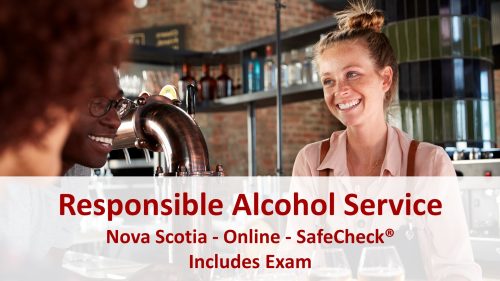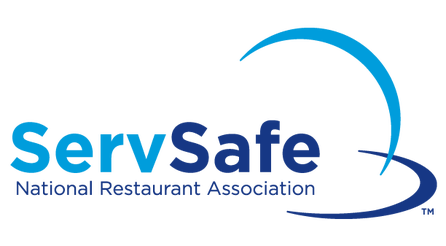Everything You Need to Know About the servsafe food handlers card and How to Get One Quickly
Everything You Need to Know About the servsafe food handlers card and How to Get One Quickly
Blog Article
Master Responsible Alcohol Solution With Comprehensive Certification Programs
The proficiency of responsible alcohol solution is not merely a governing demand; it is a basic element that boosts the credibility and functional integrity of facilities within the friendliness market. Comprehensive certification programs use important understandings into neighborhood laws, efficient treatment methods, and consumer engagement methods. By buying these training efforts, organizations can foster a culture of duty among their staff, mitigating dangers and enhancing client satisfaction. The path to efficient execution and its long-term benefits may not be as simple as it appears. What obstacles exist in advance for those who look for to raise their solution criteria?

Value of Responsible Alcohol Solution
Responsible alcohol solution is vital to advertising public health and wellness and safety and security in facilities that serve liquors. It encompasses a series of practices created to avoid the overconsumption of alcohol, lower the risk of alcohol-related injury, and make sure a risk-free setting for patrons and personnel alike. By upholding accountable solution criteria, facilities can minimize prospective cases of intoxication, which might bring about accidents, physical violence, or various other negative results.
Furthermore, responsible alcohol service enhances the overall client experience. Furthermore, establishments that adhere to accountable solution methods commonly experience reduced insurance policy costs and lowered legal liabilities.
Moreover, implementing responsible alcohol service methods lines up with wider public health and wellness efforts intended at minimizing compound abuse and promoting community wellness. This aggressive strategy not just secures private customers however also adds to a much healthier society. Ultimately, responsible alcohol solution is not simply a legal obligation; it stands for a moral commitment to the well-being of consumers and the neighborhood at big.
Trick Parts of Certification Programs
Certification programs for liable alcohol service normally encompass numerous key elements designed to furnish staff with the needed skills and understanding to offer alcohol safely. Most importantly, these programs typically consist of comprehensive training on regional and state alcohol regulations, making sure that individuals understand their lawful obligations and the consequences of falling short to conform.
Another vital part is the recognition of signs of drunkenness - servsafe food handlers card. Personnel are educated to identify behavior cues suggesting when a patron may be over-served, allowing them to intervene properly
In addition, effective communication techniques are highlighted, showing team just how to engage with customers in a manner that promotes responsible drinking. This includes training in problem resolution strategies, permitting team to take care of challenging circumstances comfortably and skillfully.
Additionally, programs often integrate functional situations and role-playing exercises, offering participants with real-life examples to exercise their abilities. Ongoing education and learning and sources are vital for maintaining knowledge and abilities over time, as guidelines and best practices advance. With each other, these elements create a thorough structure that empowers team to promote a safer alcohol consumption atmosphere while reducing liability for facilities.
Benefits for Team and Facilities
Staff and facilities alike reap substantial gain from joining liable alcohol service certification programs. For team, these programs enhance expertise and skills connected to alcohol service, outfitting them to determine signs of intoxication and execute reliable intervention strategies. This training not just fosters a feeling of self-confidence among staff members but additionally advertises a culture of safety and security and responsibility in the office.
For establishments, buying qualification programs can result in minimized liability and fewer official source cases connected to over-serving. By ensuring that personnel are trained in liable service methods, facilities can mitigate dangers connected with alcohol-related cases, thus shielding their credibility and monetary security. Lots of territories supply incentives, such as lower insurance coverage costs, for licensed facilities.
In addition, implementing certified techniques can enhance client satisfaction and loyalty. Patrons are more probable to return to venues that prioritize their security and well-being. Eventually, a commitment to accountable alcohol service not only cultivates a positive environment but also boosts the total operational efficiency of facilities, making it a clever financial investment for lasting success in the friendliness market.
Typical Difficulties in Alcohol Service
Ensuring effective alcohol service is not without its challenges, also in facilities dedicated to responsible practices. One substantial obstacle is the requirement for personnel to accurately analyze patrons' alcohol consumption degrees. servsafe food handlers card. This needs a keen understanding of how numerous aspects, such as food intake, resistance, and private differences, affect intoxication
In addition, the stress to optimize sales can contravene accountable service protocols. Employees might deal with troubles in refusing solution to intoxicated people, especially in social environments where peer stress and expectations prevail.
One more challenge is staying upgraded with neighborhood laws and laws relating to alcohol service. Conformity is vital, yet frequent modifications in legislation can produce complication and may bring about unintentional infractions.
Educating programs may not always cover the nuances of real-world situations, leaving personnel ill-equipped to take care of complicated situations. Inconsistent communication between monitoring and staff members relating to expectations for accountable solution can further worsen these concerns.
To navigate these difficulties properly, establishments need to cultivate an atmosphere of assistance, stressing the significance of accountable solution while providing the required tools and training for team to succeed.
Steps to Acquire Qualification
To get Responsible Alcohol Service Accreditation, candidates typically begin by investigating the details requirements mandated by their local regulative authorities. These demands might differ dramatically depending on the region, so it is important to familiarize oneself with the appropriate regulations and laws.

After choosing a program, applicants need to finish the requisite training, which typically covers subjects such as identifying drunkenness, recognizing legal duties, and implementing methods for responsible service. Individuals should actively involve with the material, as this understanding is vital for efficient alcohol solution.

Adhering to training, he has a good point candidates usually take an examination to evaluate their understanding of the material. Effective conclusion of this assessment results in accreditation.
Conclusion
To conclude, understanding responsible alcohol service with thorough certification programs is important for promoting security and improving consumer experiences within the friendliness sector. By equipping staff with the necessary knowledge and skills, facilities not just alleviate threats linked with overconsumption and lawful responsibilities but also grow a society of duty. This dedication to liable solution eventually look what i found causes boosted client commitment and operational success, reinforcing the importance of ongoing training and adherence to alcohol solution criteria.
Report this page